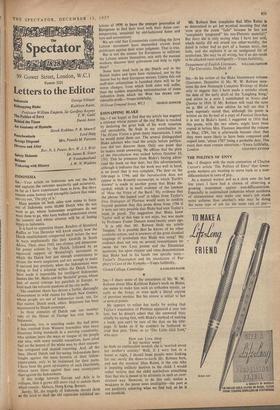KIDNAPPING BLAKE
SIR,—I am happy to find that my article has angered a reviewer whose picture of the real Blake is reached by declaring the great bulk of his work valueless and unreadable. He finds in my contribution to The Divine Vision a great many inaccuracies. I wish he would point them out. The several distinguished Blake scholars who read the article before publica- tion did not discover them. Only one point that he makes needs answering. He affirms that the plate of the Introduction was etched before October 10, 1793.. This he presumes from Blake's having adver- tised the book on that date; but this advertisement, although it indicates that the work was well in hand, is no proof that it was complete. The date on the title-page is 1794; and the Introduction does not appear in the Rossetti manuscript, in which 'Earth's Answer' is made to another poem that Blake dis- carded; which is in itself evidence of the lateness of 'Hear the Voice of the Bard.' My evidence that the phrase 'the lapsed soul' is taken from Taylor's Five Dialogues of Plotinus would seem to confirm beyond question that this poem dates from 1794 if it were not very possible that Blake had seen Taylor's book in proof. The suggestion that Blake knew Taylor well at this time is not mine, but was made by Professor Foster Duncan some twenty years ago.
It is odd that Mr. Robson finds my article 'Jungian.' Is it possible that he knows of no other symbolic system, and is unaware of the great classical language of symbolism that Blakb was using? My evidence does not rest on several resemblances be- tween the two Lyca poems and the Eleusinian mysteries, but upon chapter and verse demonstration that Blake had in his hands two specific texts— Taylor's Dissertation and his translation of Por- phyry's Cave of the Nymphs.—Yours faithfully, Girton College, Cambridge KATHLEEN RAINS






































 Previous page
Previous page